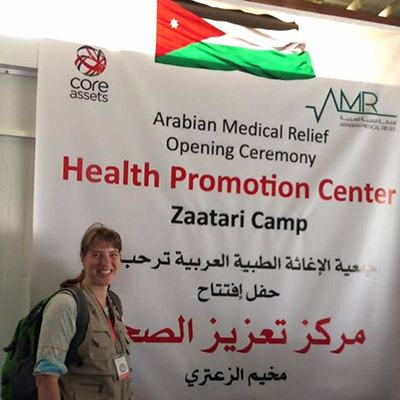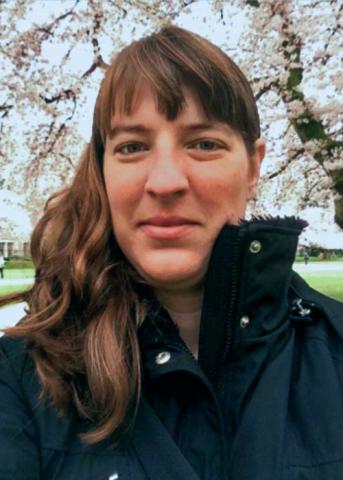Why did you join the military?
My family has a history of military service (three brothers, dad, step-dad), and I liked the idea of being able to serve my country. I also needed a way to pay for medical school and this seemed like a great way to do it.
How long did you serve and where?
I served for four years in the Air Force Reserves while I was in medical school, and then an additional nine years active duty. I was stationed in Portsmouth, Virginia; Okinawa, Japan; and near Cambridge, England.
Describe your first days in service.
My first days on active duty were also my first days of residency, so they were quite hectic. I was trying to learn medicine and military life at the same time, but I never had any doubts that this was something I wanted to do.
What was your main job assignment and what was a “typical” day like?
I was a pediatrician. We were quite busy, especially overseas. In Okinawa, clinic usually started at 8am and we saw patients until 4pm. Paperwork usually lasted another two to three hours. In the U.K., our clinic started at 7:30am and lasted until 4pm. We also covered the hospital on base, so we admitted patients and attended deliveries. We took call for a weekend once a month. It wasn’t unusual to work 60-70 hours a week.
Tell me about some of your most memorable experiences while serving.
They’re almost all related to patients I've taken care of. The military community is quite tight, especially overseas. Everyone knows everyone else and you get to know patients really well. I loved watching patients grow up after I attended their deliveries.

Did you receive any medals or citations, and what for?
I got a citation for extended overseas tours and was selected as Officer of the Quarter for the clinic.
How did you feel the day you were discharged and how did it change your life?
When I was discharged, it felt a little bit like a part of me was gone. My military service was very hard, but I learned a lot and it was also a lot of fun. I have a lot of appreciation for the sacrifices military families make day in and day out. Deployments and moving every couple of years can be quite stressful on families.
What does it mean, to you, to be a veteran?
As a veteran, I am proud of my service. I loved working with military families.
Why did you decide to go back to school to get an MPH?
I want to practice international medicine. I chose global health because I want to know how the world of international medicine works.
Why did you choose the UW?
It has a good ranking for public health, and the tuition is in state. (Later legislation mandated that all public schools give Veterans in-state tuition, but that was not the case when I applied.) I had never been to the Northwest, but it seemed like a cool area of the country to be in for someone who likes hiking and the outdoors.
What kind of research are you doing?
I'm particularly interested in humanitarian emergencies and disaster relief. Right now, I'm finishing my thesis on the skills needed for health care workers who will be working in combat zones. I'm also volunteering in a refugee camp on the Greek island of Kos for three months.
Tell us more about your volunteer work.
I am one of only two doctors here. I found this opportunity through the Syrian American Medical Society. They place volunteer doctors and nurses with KEELPNO, which is essentially the Greek version of the Centers for Disease Control and Prevention. KEELPNO also provides nurses and translators. We do mainly primary care for the refugees.
What are your future goals?
My goal is to split my time between medicine in the U.S. and working or volunteering overseas in disaster relief. Maybe work with Doctors Without Borders or a similar organization.

